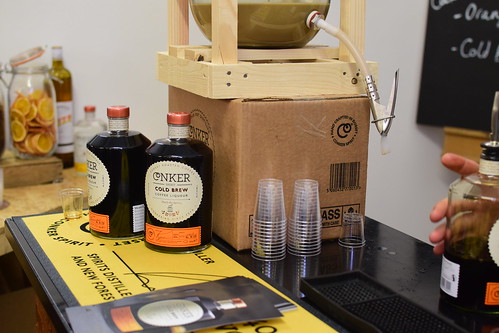The day was ebbing into its later stages and it seemed like the perfect opportunity to slowly make my way from coffee into alcohol via the convenient route of coffee liqueur. So I swung by the Mr Black stand to try some of their light enveloping black magic. Made from distilled grain alcohol – that’s Vodka to you and me – and blended with cold pressed coffee, Mr black produces a liqueur that’s sweet and light with distinct flavours of dark roast espresso and a lifting edge of citrus. Mentally considering its uses for coffee in good spirits competitions, I headed off to find some more liqueur.
I’d seen Conker on my rounds and thought it was a great opportunity to do a direct comparison, coffee liqueur to coffee liqueur, so to speak. On first appearances I’d just traded one stand for another, one vessel of liquid for another, everything appeared to be pretty much the same. Taking a sample I tasted it to see if there were any discernible differences. Made from distilled grain alcohol again this is blended with cold brew coffee to create Conker’s liqueur, which offers a slightly darker profile to Mr Black’s, replacing sweet and light tones with an emphasis towards the darker sugars, more demerara and molasses. No better, no worse, just different one lighter and sweeter the other darker and more intense, but essentially with a similar flavour.. and which one should you choose? Well I would suggest that all depends on the drink you’re making, which will no doubt be made all the better by either.
http://www.conkerspirit.co.uk/
Having stepped off into the world of spirits, I made it firmly back to solid ground(s) with Raw Material and their 5pm cupping. Having been labelled as ‘the ones to watch’ earlier in the day, I’d made a mental note not to miss their last scheduled cupping on the 5pm slot. Browsing over some of the materials on the stand, it was clear these new green bean suppliers had been keeping themselves busy, sourcing coffee from Rwanda and Colombia, as well as the little tasted – by me at least – coffee region Myanmar.
I’d been hearing murmurings about their coffee, Rwanda Kilimbi this and Wush Wush that, not that I had something tangible to tie to this exactly, all of this was new to me. In truth I’d tried Outpost Coffee Roasters Rwanda Kilimbi earlier in the day and loved it, but it seems like this might have just been the tip of the iceberg. Raw Material began the cupping, water poured, timer approved, crusts broken, hokey cokey style knee bends to get those scents wafting up the nostrils, we now had spoons in hand ready to taste.
Tasting along the line, there was the natural and washed versions of the Myanmar, followed by the washed, honey and natural Colombian Wush Wush. I slurped my way through each bowl, noting significantly as I went that my standout favourites were the Myanmar natural and the Colombian washed. Strong flavours, strong acidities and a cross pervading high quality, I was impressed. Vocalising my preferences, brought a wry smile, followed by a ‘well that makes sense’. It turns out that both the natural Myanmar and the washed Colombian had both undergone the longest fermentation periods, interesting I thought… or was that really! interesting I thought? I’d noticed something in chocolate already, that fermentation techniques have a very significant effect on flavour, could it be that fermentation rather than processing technique has a greater degree of effect on flavour in coffee? I didn’t immediately know the answer to this question, but I knew it was one that had grabbed my attention.
I finished the tasting sampling some batch brewed Rwanda Kilimbi, initially turning down a cup, explaining that I’d already tried it earlier in the day, although as it turned out this particular cup was brewed from the following years harvest, which had only just landed. Slightly less acidic and more of a delicate strawberry to the full in your faceness of Outpost Coffee roasters brew earlier, again Raw Material smiled and began explaining. They source coffees, while thinking about how that coffee will develop in 6 months from now, when it’s sold to the roaster to roast, the roaster buys coffee thinking about how it will change 6 months from then. As an organic good, the coffee I was tasting was likely to change, to become more acidic, to develop into something like the coffee I’d tried from Outpost Coffee Roasters. It seems that coffee might not just be about observations of quality, but in calculating the experience of different users in the chain, from the Raw Material in the earth to the Raw Material in the cup.








Pingback: Cup North 2017 Part 2 |